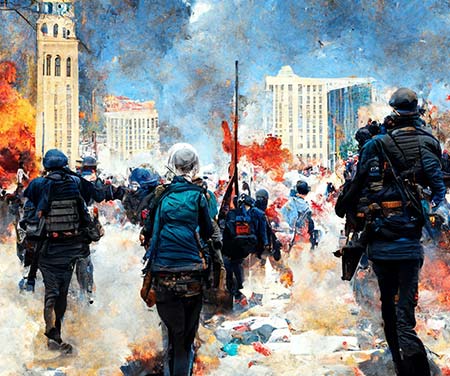Characters
Archetypes Keywords • Philosophical and ethical stances
“The East Wind is an impassive-faced tyrant
— Joseph Conrad
with a sharp blade held behind his back
to deliver a treacherous stab”
The characters in The East are all environmentalists and activists, but with potentially very different philosophies, inclinations, and goals. Each of the protagonists of our story is introduced by a short teaser that describes their main characteristics. They are all part of one of three movements that define their background and modus operandi. They are also framed by a philosophical-political inclination and an archetype that suggests what their interpretative character will be.
The brief description in the teaser may not be enough to direct you toward the most suitable choice, since it is in fact public information in which the primary characterization is not always evident. The most glaring example is the character hiding a terrible secret or suffering from psychological instability. It is difficult for these traits to be expressed in a clear form because at the core of the character is his or her secret dilemma. Some characters will also tend to be more the center of attention while others will be focused on an intimate and less flashy game; for example, respectively, the King of France is always in the spotlight, and his personal valet, blackmailed into assassinating him.
In the Advice field of each character you may find, in addition to any costume requirements, keywords that will guide you in your choice of character more easily.
ARCHETYPE KEYWORDS
Troubled - This character is haunted by something. It can be alcohol, drugs, crime, emotive instability, a dangerous or painful past, and so on.
Examples: Kate in “Lost”, Morgan Dexter in “Dexter”, Detective McNulty in “The Wire”, John Nash in “A Beautiful Mind”.
Over-the-top - An histrionic, proactive, and shameless character who usually ends up under the spotlight.
Examples: Sergeant Hartman in “Full Metal Jacket”, Dr. Cox in “Scrubs”, Johnny Depp’s Captain Sparrow in “Pirates of the Caribbean”.
Ill-fated - Problems flock to this character like bees to honey. He or she experiences a lot of unexpected events, crises, and problems. It almost looks like the whole universe is plotting against them...
Examples: Luke Skywalker in “Star Wars”, Jesse Pinkman in “Breaking Bad”, Marty McFly in “Back To The Future”.
Introspective - This character prefers to stay away from the limelight. He or she has a discreet, understated, or shy style, and his or her personal relations are exclusive and focused on exploring personal problems.
Examples: Simon in “Misfits”, Richard Harrow in “Boardwalk Empire”, Ruth in “Fried Green Tomatoes”, Ryan Gosling in “Drive”.
Obsessed - Characters who are strongly determined in the pursuit of a goal or an idea; willing to do anything, ambitious, idealistic, but also desperate, blackmailed, controlled by the sense of duty, revenge, etc.
Examples: Walter White in “Breaking Bad”, The Bride in “Kill Bill”, Fox Mulder in “X-Files”, John Hammond in “Jurassic Park”.
PHILOSOPHICAL AND ETHICAL STANCES
In The East, we will explore a conflicting and complex reality, in which ideals and concrete goals often overlap and generate difficult and controversial moral choices.
The protagonists of this drama move in a contemporary, highly realistic, and credible setting, dealing with hot topics of current affairs and conflicts of substance and method that can challenge their personal relationships and their adherence to ideologies, attitudes and beliefs.
The social and political questions that we invite you to explore are also embodied in a series of dichotomies that define the characters. The way we think, the values we believe in, and the principles we consider a foundation of our society, bring us closer to other individuals and separate us from others. Sometimes, they also put us at odds with ourselves.
This is the kind of character we are proposing to the participants of The East and these are the political, ideological and social dichotomies we want to address:
ACCELERATIONISM vs PRIMITIVISM
Accelerationism: “The only way out is the way through.”
For an accelerationist, embracing the destructive forces running through the world is the only way to truly save it. Push on the acceleration pedal, escalate the disintegration, turn up the volume to the max. It is only by embracing these forces that one can truly move beyond what already exists; and among these forces, none is more powerful than Technology. Those who adopt this vision will look favorably, even enthusiastically, upon any kind of innovative technology and/or science. It is useless to fight against the tide of progress, it is rather necessary to steer it, to use it to highlight the contradictions it conceals and unmask all the hypocrisies of the present. A leveled ground on which to finally rebuild.
Primitivism: “The Industrial Revolution and its ramifications have been a disaster for the human race.”
A primitivist views the progress brought by science and technology with suspicion, if not horror. If ever there was an Eden, we lost it when we forfeited the communion with nature to obtain the comforts of modernity in return. Powers greater than us have taken over the human kind; forces no one can direct and that will ultimately doom us all. Salvation lies in sacrifice. Those who adopt this stance will try in every way to fight against any technological 'enthusiasms', even the best-intentioned ones, promoting instead a return to nature. Should they find something dangerous in their hands, they will not hesitate to set it on fire.
PACIFISM vs VIOLENCE
Pacifism: Those who practice non-violence categorically refuse to use physical aggression and prevarication as a method of persuasion or conflict resolution. Pacifism may be driven by ideological reasons, a uniquely personal aversion or inability to harm someone or a mixture of both.
Violence: Those who believe that it is acceptable to use force and prevarication to enforce their views or achieve their goals. The propensity to use violence as a form of conflict resolution may be considered a necessary evil, a personal inclination, or both.
SPIRITUALITY vs NIHILISM
Spirituality: One who believes that there is a level of existence, not perceivable with the physical senses, situated beyond the tangible one, and from which the latter draws its life, intellect, or, at least, purpose to exist. This may also go as far as including belief in supernatural beings or powers (as in religion), though with the emphasis always placed on the experience's personal value. It reveals a distinctive sensitivity and deep adherence to spiritual values, whether religious or philosophical, capable of guiding human existence, offering comfort, and establishing moral imperatives.
Nihilism: One who rejects the transcendent values and meanings elaborated by different religious or moral and philosophical systems and instead believes that existence has no higher purpose. Reality is trivially ruled by fate. There are no absolute truths that transcend the laws of physics or free will, nor do they play any role in the lives of human beings. Blindly believing in something is a form of illusion,it can be reassuring, but is nonetheless dangerous and foolish and limits the freedom and responsibility to determine our own lives and those of all that surround us.
DECISIONISM vs COMMITTEE
Decisionism: The behavior and actions of those who tend to overcome situations of immobility with acts of deliberate individuality, or to impose a particular position they deem necessary in spite of others' consensus. Obtaining concrete results quickly and efficiently is always imperative, when the conflict with others' opinions threatens the achievement of their goals or the urgency of their moral dictates, it is necessary to ignore the talk and act.
Committee: Those who believe deeply that democratic practice applies to everyday life and therefore seek a collective majority to make common decisions. The group will always win out over the interests of the individual: before acting, it is always necessary to reach a broad collective consensus, even at the cost of slowing down the decision-making process or sacrificing one's personal convictions.
CONSPIRACISM vs RATIONALISM
Conspiracism: It is the belief that citizens are deliberately misinformed and kept in the dark about facts and notions of various kinds. It includes a deep-rooted distrust of the mainstream media, which are considered to be influenced or managed by power groups or individuals, interested in steering or manipulating public opinion. “The Powers That Be” exist and keep inconvenient truths hidden: no matter if something is considered implausible or impossible by mainstream culture, it might still be true.
Rationalism: Those who follow this orientation are not biased against the modern media and interpret reality based on provable facts. Rationalists tend to assess the content of reputable newspapers, institutions, and official media, on a case-by-case basis and by resorting to 'basic principles' such as scientific criteria, notions of plausibility and probability, and 'common sense'.





